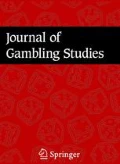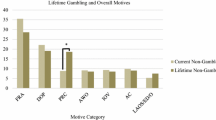Abstract
The present research combined qualitative and quantitative approaches in examining gambling motives among college student gamblers. A comprehensive set of 16 gambling motives was identified by categorizing 762 open-ended reasons for gambling, provided by 184 college student gamblers. Results revealed that most college students gamble to win money, for fun, for social reasons, for excitement, or just to have something to do. Overall, the results suggest the need for an eclectic biopsychosocial approach with regard to etiology of college student gambling.
Similar content being viewed by others
REFERENCES
Beaudoin, C. M., & Cox, B. J. (1999). Characteristics of problem gambling in a Canadian context:A preliminary study using a DSM-IV-based questionnaire. Canadian Journal of Psychiatry, 44, 483–487.
Bergler, E. (1958). The Psychology of Gambling. New York: International University Press.
Brown, R.I. (1987). Classical and operant paradigms in the management of gambling addictions. Behavioral Psychotherapy, 15, 111–122.
Griffiths, M., & Delfabbro, P. (2001). The Biopsychosocial Approach to Gambling: Contextual Factors in Research and Clinical Interventions. eGambling: The Electronic Journal of Gambling Issues, 5, feature. Retrieved April 26, 2002, from http://www.camh.net/egambling/ issue5/feature/index.html
Jacobs, D.F. (1986). A general theory of addictions: A new theoretical model. Journal of Gambling Behavior, 2, 15–31.
Klingemann, H. K. H. (1995). Games, risk and prevention: The rehabilitation of “Homo Ludens.” Journal of Drug and Alcohol Education, 41,99–123.
Ladouceur, R. Dube, D., & Bujold, A. (1994). Prevalence of pathological gambling and related problems among college students in the Quebec metropolitan area. Canadian Journal of Psychiatry, 39, 289–293.
Ladouceur, R. & Walker, M. (1998). The cognitive approach to understanding and treating pathological gambling. In A. S. Bellack and M. Hersen (Eds.). Comprehensive Clinical Psychology (pp. 588–601). New York: Pergamon.
Lesieur, H. R., & Blume, S. B. (1987). The South Oaks Gambling Screen (SOGS): A new instrument for the identification of pathological gamblers. American Journal of Psychiatry, 144, 1184–1188.
Lesieur, H. R., Cross, J., Frank, M., Welch, M., White, C. M., Rubenstein, G, Moseley, K., & Mark, M. (1991). Gambling and pathological gambling among university students. Addictive Behaviors, 16, 517–527.
McCormick, R. A. (1987). Pathological gambling: A parsimonious need state model. Journal of Gambling Behavior, 3, 257–263.
Rosenthal, R. J. & Rugle, L. J. (1994). A psychodynamic approach to the treatment of pathological gambling: Part I. Achieving abstinence. Journal of Gambling Studies, 10,21–42.
Shaffer, H. J., Hall, M. N., & Vander Bilt, J. (1999). Estimating the prevalence of disordered gambling behavior in the United States and Canada: A research synthesis. American Journal of Public Health, 89, 1369–1376.
Sheeran, P., & Orbell, S. (1999). Augmenting the theory of planned behavior: Roles for anticipated regret and descriptive norms. Journal of Applied Social Psychology, 29, 2107–2142.
Author information
Authors and Affiliations
Corresponding author
Rights and permissions
About this article
Cite this article
Neighbors, C., Lostutter, T.W., Cronce, J.M. et al. Exploring College Student Gambling Motivation. J Gambl Stud 18, 361–370 (2002). https://doi.org/10.1023/A:1021065116500
Issue Date:
DOI: https://doi.org/10.1023/A:1021065116500




